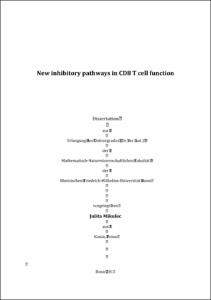New inhibitory pathways in CD8 T cell function

New inhibitory pathways in CD8 T cell function

| dc.contributor.advisor | Diehl, Linda | |
| dc.contributor.author | Mikulec, Julita | |
| dc.date.accessioned | 2020-04-22T02:14:50Z | |
| dc.date.available | 2020-04-22T02:14:50Z | |
| dc.date.issued | 07.06.2016 | |
| dc.identifier.uri | https://hdl.handle.net/20.500.11811/6772 | |
| dc.description.abstract | An adaptive immune response is initiated upon recognition of antigen presented on the surface of antigen-presenting cell (APC) by T cells. CD8 T cells primed in the liver by antigen-presenting liver sinusoidal endothelial cells (LSECs) develop into nonresponsive cells with a memory-phenotype. Liver-primed CD8 T cells are not terminally committed to this unique differentiation state but develop into effector cells upon infection. The adaptive immune response is balanced by co-stimulatory and co-inhibitory signals. LSEC-primed CD8 T cells require co-inhibitory PD-L1 signals delivered by LSECs to develop into a nonresponsive/memory state. In this study we investigated the relation between PD-L1/PD-1 signaling at early time-points and formation of an immune synapse, which may play a role in further development of effector function in T cells. Upon antigen-specific interaction of APC and T cell, an immunological synapse is formed at their interface that is required for signaling exchanged between these cells. In this study, we demonstrate that LSEC-CD8 T cell interaction results in multifocal immune synapse formation. Furthermore, although the development of nonresponsive state of liver-primed CD8 T cells requires co-inhibitory PD-L1/PD-1 signaling, the formation and phenotype of the immune synapse did not. Not only the absence of PD-L1 signaling, but also delivery of CD28 co-stimulatory signals can prevent differentiation of CD8 T cells into nonresponsiveness after priming by LSEC. Interestingly, we found that co-stimulation via CD28 was able to overcome this unique differentiation program when introduced between 0 and 36 hours of LSEC-CD8 T cell coculture, indicating that co-inhibitory PD-1 signaling is required to be integrated during this time to induce typical liver-primed non-responsive memory like T cells. Gene expression analysis identified the small GTPase ADP-ribosylation factor 4D (Arl4d) to be overexpressed in LSEC-primed CD8 T cells, compared to DC-primed CD8 T cells. More interestingly, Arl4d expression in CD8 T cells during LSEC-priming is dependent on PD-L1/PD-1 signaling. Similar to T cells activated in the presence of co-inhibitory PD-1 signaling, in the presence of Arl4d expression IL-2 production by CD8 T cells is attenuated in vitro and in vivo. In addition, Arl4d restricts effector CD8 T cell development and expansion on viral infection. Taken together, this study reveals a new as-yet undiscovered inhibitory function of Arl4d in modulating T cell immunity most likely via the regulation of IL-2 availability. Therefore, Arl4d might act downstream of co-inhibitory PD-1 signaling and thus play role in the regulation of CD8 T cell immunity. | en |
| dc.language.iso | eng | |
| dc.rights | In Copyright | |
| dc.rights.uri | http://rightsstatements.org/vocab/InC/1.0/ | |
| dc.subject.ddc | 570 Biowissenschaften, Biologie | |
| dc.subject.ddc | 610 Medizin, Gesundheit | |
| dc.title | New inhibitory pathways in CD8 T cell function | |
| dc.type | Dissertation oder Habilitation | |
| dc.publisher.name | Universitäts- und Landesbibliothek Bonn | |
| dc.publisher.location | Bonn | |
| dc.rights.accessRights | openAccess | |
| dc.identifier.urn | https://nbn-resolving.org/urn:nbn:de:hbz:5n-43827 | |
| ulbbn.pubtype | Erstveröffentlichung | |
| ulbbn.birthname | Kaczmarek | |
| ulbbnediss.affiliation.name | Rheinische Friedrich-Wilhelms-Universität Bonn | |
| ulbbnediss.affiliation.location | Bonn | |
| ulbbnediss.thesis.level | Dissertation | |
| ulbbnediss.dissID | 4382 | |
| ulbbnediss.date.accepted | 11.02.2016 | |
| ulbbnediss.institute | Medizinische Fakultät / Institute : Institut für Experimentelle Immunologie (IEI) | |
| ulbbnediss.fakultaet | Mathematisch-Naturwissenschaftliche Fakultät | |
| dc.contributor.coReferee | Lang, Thorsten |
Dateien zu dieser Ressource
Das Dokument erscheint in:
-
E-Dissertationen (4400)




